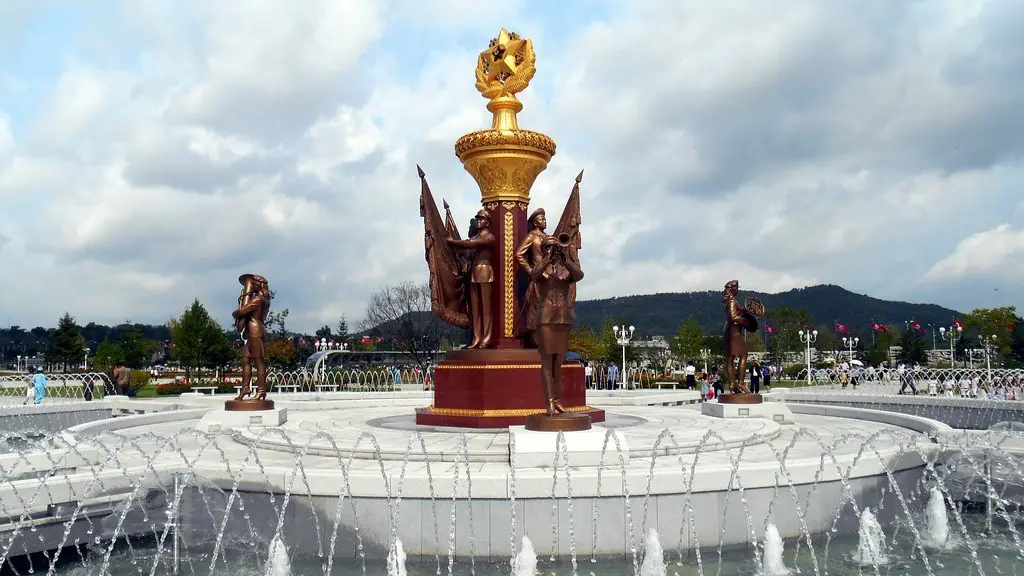Beginnings of North Korea
Kim Il-sung, the first leader of North Korea, took the reins of power from Japanese occupiers in the late 1940s and established a totalitarian-style government in Pyongyang. The personality cult surrounding Kim Il-sung, carried through by his successors, had a major psychological impact on North Koreans. After the Korean War, North Korea sought to further strengthen its rule with a dual-track approach of discouraging political opposition through brutal repression and of cultivating support through socialist ideals of equality, self-sufficiency and patriotism.
For decades, North Korea’s leaders have used a militarized domestic and foreign policy to remain in power. Already distant from the global community prior to COVID-19, North Korea has since further cut itself off from the world. The country has heavily limited or prohibited cross-border movements, created a dual-currency system and increased the Security Bureau’s investigative power.
Why Destroying North Korea Is Not A Good Idea
For one, the already-deteriorating public health systems of North Korea could suffer complete collapse under the weight of military operations. Along with the security threats, this could lead to a health crisis on an unimaginable scale. This could quickly overwhelm the country’s environment and adversely affect the health of people living in the surrounding region.
In addition to the humanitarian costs, a complete foreign military intervention would also divert attention away from the economic and political issues that need resolving in North Korea. The long-term trajectory of the country is most probably a democratic transition, and a large-scale military operation would act as a major distraction from these discussions.
Unpredictable Chain Of Events
A military attack on North Korea could also deter foreign policies. It could start a chain reaction of military escalation in northeast Asia that could lead to a conflict lasting for generations. Due to North Korea’s alliance with Russia, a military clash in Korea might easily trigger a major world war.
North Korea’s extensive military armament with nuclear weapons and long-range missiles could make a foreign invasion even more destructive. North Korea is estimated to have up to 15 nuclear warheads, with countless medium-to-long range missiles that could be used for a nuclear counterattack directed against South Korea and other East Asian countries.
International Community May Not Support Interventions
Despite North Korea’s authoritarian rule and human rights violations, the international community is divided on the issue of addressing North Korea’s political and social issues. China and Russia, in particular, have declared strong opposition to a military invasion of North Korea.
China has diplomatic relations with North Korea and is likely to continue to maintain them, despite their strained diplomatic relationship. As China’s main trading partner and largest source of aid, China is likely to remain opposed to any military offensive against the North.
Russia has also been a long-time ally of North Korea and has the capability to join a military conflict in the region. In fact, Russia gave Kim Jong-un his first diplomatic visit in 2018 and has been highly critical of any potential foreign invasion of North Korea.
Possible Alternatives To Destruction Of North Korea
The international community has to date largely refused to intervene in North Korean politics, and it is unlikely to change on the basis of human rights violations alone. However, the country could still move towards democratic change if the right incentives and supports are put in place.
In recent years, the US and South Korea have sought to foster economic and diplomatic exchanges with North Korea in a bid to encourage the country to transition from its state of isolation. This ongoing process of engagement carries much more potential for change in North Korea than a military invasion and could help form meaningful connections between North Korea and its neighbors.
Potential Benefits From Uniting The Two Koreas
Uniting the two Koreas could bring about many benefits for both countries. Reunification could potentially increase the competitive spirit between the two Koreas, as well as provide much-needed economic resources such as capital, labor, and markets. Cultural and social unification could also lead to improved cultural and social integration, as well as to similar economic and political radical reforms that could be beneficial to both sides.
More importantly, reunification could also reunify long-separated families, many of whom have not seen each other since the end of the Korean War. This could provide a psychological boost to both Koreans, which could potentially increase the chances of successful reunification.
Risk Of Interfering With China’s Ambitions
The prospects of a unified Korea would also pose risks of interference with China’s ambitions to dominate the region. China views a unified Korea as being an obstacle to its own ambition to create a superpower in the region, and so it is unlikely to be supportive of reunification efforts.
Furthermore, the reunification of the two Koreas could also significantly reduce China’s influence in the region, as the two Koreas would no longer need to depend on China for protection and support if they are unified. This could potentially be detrimental to China’s regional goals.
Political Weakness Of North Korea
The political weaknesses of North Korea could make it difficult for the country to recover from the effects of a military invasion. Despite the Kim family’s decades of rule, the country still faces numerous challenges, including an aging population, a lack of resources, and a heavily-permeated circle of internal political dissent.
Further, North Korea’s economic woes are only growing. Over the past decade, the country has suffered through a detrimental drop in food production, sanctions, and extreme weather. These issues have further exacerbated the long-standing food shortages, poverty, and a lack of economic resources that are preventing the country from progressing economically.
Potential Impact On Innocent Population
The population of North Korea would also be heavily impacted by a foreign invasion. Although many citizens of North Korea are in staunch support of the government, it is considered highly unlikely that the general population would be in favor of a foreign intervention. This could easily lead to an outpouring of protests, which could further contribute to internal instability.
It is also important to consider the impact on North Korean civilians. A violent intervention could lead to a prolonged civil conflict that could cause further suffering to an already-beleaguered population. This potential for needless suffering is a major reason why the destruction of North Korea should not be a viable option.
International Pressure And Sanctions As An Alternative To War
The international community should look to robust international pressure, diplomacy and sanctions as the primary means of addressing North Korea’s issues. This would provide a space for dialogue without resorting to military force, while still dramatically raising the costs of a bad action by North Korea.
Currently, several international initiatives are taking place to achieve this goal, including the US-led world sanctions, the proposed Chinese-Russian-Korean economic corridor, and the UN Security Council resolutions. All of these efforts have the potential to create a politico-economic bargaining mechanism that can convince North Korea to change its behavior and take responsibility for its misdeeds.
Peaceful Negotiations
In the past, North Korea has shown a willingness to negotiate and reach agreements, and it is possible that diplomatic engagement can be a powerful tool for the international community in managing the North Korean situation. This could include negotiations around denuclearization, human rights, and economic activities.
International organizations such as the United Nations should be heavily involved in peace and diplomatic resolutions, as well as in maintaining traditional diplomatic channels of communication with North Korea and its allies. Such diplomatic channels can provide an avenue for improved cooperation, better understanding, and the potential resolution of disputes without a resort to military force.
Efforts Need To Be Taken As A Whole
Ultimately, all measures suggested must be taken in broader context, with the understanding that full resolution of the North Korea situation requires holistic plans that can recognize and address the country’s needs, including its internal and external security, economic, environmental and humanitarian concerns.
Moreover, in the long term, great efforts must be taken to ensure North Korea has a stable and fair political system which will enable it to reach a point of sustainable economic and political development. This will not just be beneficial to the people of North Korea, but to South Korea and the entire region as well.


